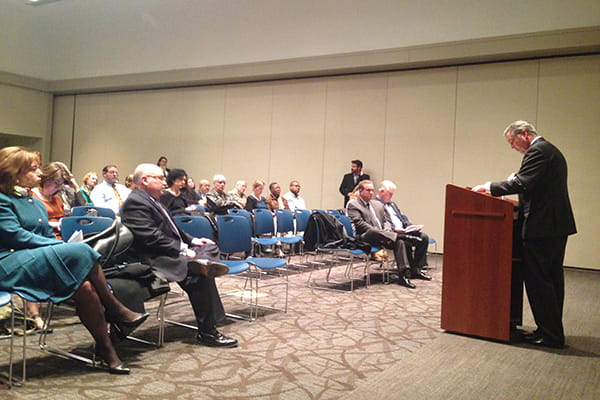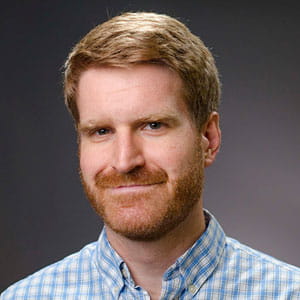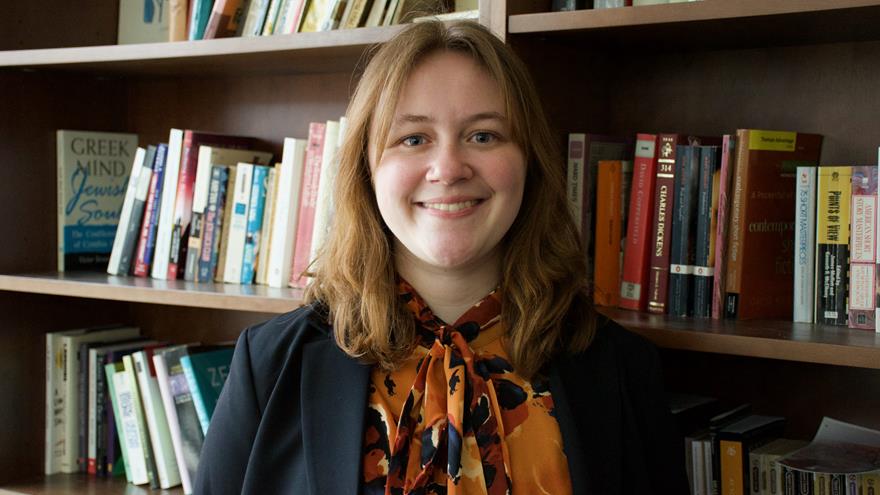Money on the mind: Fry addresses finances at faculty town hall

Dollars and cents were a frequent topic of conversation at President John Fry’s town-hall meeting for faculty at the University City Campus this week, and Drexel’s financial numbers paint an optimistic picture, Fry said.
Fry, who said his current round of strategic plan town halls was part of an effort to maintain transparency on finances and other issues, said the University looks fiscally healthy. Its operating margin — the difference between revenue and expenses — was at $70 million last year, he said.
“That’s very, very healthy for an organization of our size,” Fry said in response to the first question of the meeting on Monday, which inquired about the University’s financial status.
Money was a frequent topic as Fry provided a wide-ranging update on the implementation of Drexel’s strategic plan and responded to questions from the University’s balance sheets to fundraising to affordability for students. In all of those areas, Fry said, the numbers are trending in positive directions.
Drexel’s consolidated change in assets — the growth of assets over liabilities — last year was $170 million, he added, and its debt ratings are “stable.” Overall, he said, the University’s financial management is strong.
“It’s a much more disciplined approach,” Fry said, “and I think it’s going to serve us well in the future.”
Part of that, he said, would be a shift to a responsibility-centered management, which would give the provost and deans more authority to generate revenue for academic departments. It won’t be an overnight change, he said, but it will be an important one.
“In mature universities, this is the kind of thing that you see more often,” Fry said.
He also addressed finances from the point of view of Drexel students. He noted a big change in the concerns he hears from students who visit during his periodic office hours, saying that about 80 percent of those students used to come in because of financial problems. But in the past few months, he said, that percentage has shrunk dramatically. That, he guessed, is because of the opening of Drexel Central, a new one-stop student service center that brought together several formerly separate offices.
Drexel’s Student Lifecycle Management initiative should continue to alleviate students’ financial concerns as it changes the way financial aid is awarded, Fry said. The University will shift to providing more need-based aid, with supplemental merit-based aid as well.
“We’re trying to limit the gap between what our students can afford and what we allocate to them as much as possible,” Fry said, “and hopefully make Drexel a more accessible and affordable institution in the process.”
The University will also slow the increase of its tuition, room and board for the coming year, Fry said, in an effort to position its cost in the middle of the pack among its peers.
Another shift will take place in Drexel’s fundraising efforts, Fry said. With a $400 million fundraising campaign recently completed — after actually raising $454 million — the University will now move to a greater focus on endowment-based giving, with upcoming “mini-campaigns” focusing on financial aid for students and endowed professorships for faculty.
Endowed chairs were the subject of another question at the town hall. Drexel currently has 15 professorships with endowments greater than $500,000.
“We really need to get that number much higher,” Fry said.
Drexel is moving ahead with an effort to hire 100 new tenure-track faculty, as well, though the process is moving more slowly than anticipated as deans take care to hire the right people.
“We want to make the right decision,” Fry said.
The town hall also touched on a wide variety of other topics, including:
• The makeup of Drexel’s campus, and how it will align with what students want in the 21st century. Fry said his aim is a community filled with meeting places where students can interact with faculty, staff and each other freely. “The more dense we can make this campus, the more urban we can make this campus, the better off we’re going to be,” he said.
• The future of online education at Drexel. Susan Aldridge, Drexel’s new senior vice president for online learning, took a turn at the microphone and said she wanted to focus on unique niches where Drexel could step forward and grab pieces of the online-education market. “We want to lead in the really innovative and entrepreneurial ways that everyone expects,” she said.
• Drexel’s Sacramento campus, from where faculty and staff were also participating in Monday’s meeting via videoconference. Fry said the campus had made a drastic financial turnaround, turning from a “major money loser” into a self-sufficient entity that is now even creating enough revenue to invest in improvements.
One more presidential town hall is scheduled for this month, from 4 to 5:30 p.m. Dec. 11 at the Center City Campus (Geary B), for medical and health sciences faculty and professional staff. Academy of Natural Sciences employees are also welcome. To RSVP, visit Drexel.edu/strategicplan.
In This Article
Drexel News is produced by
University Marketing and Communications.

